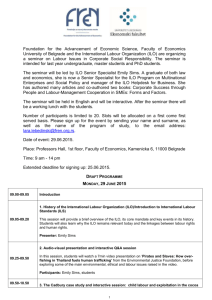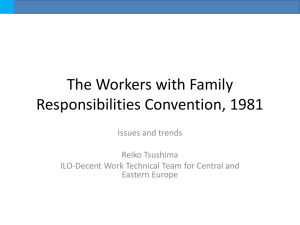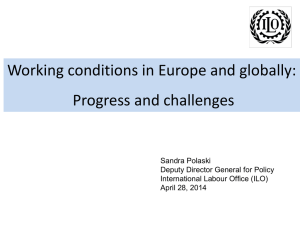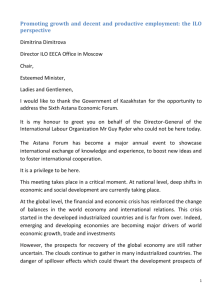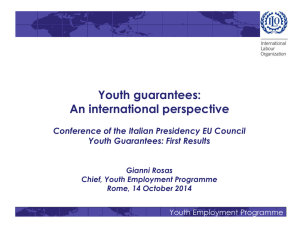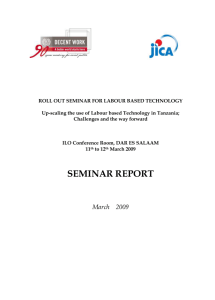The report
advertisement
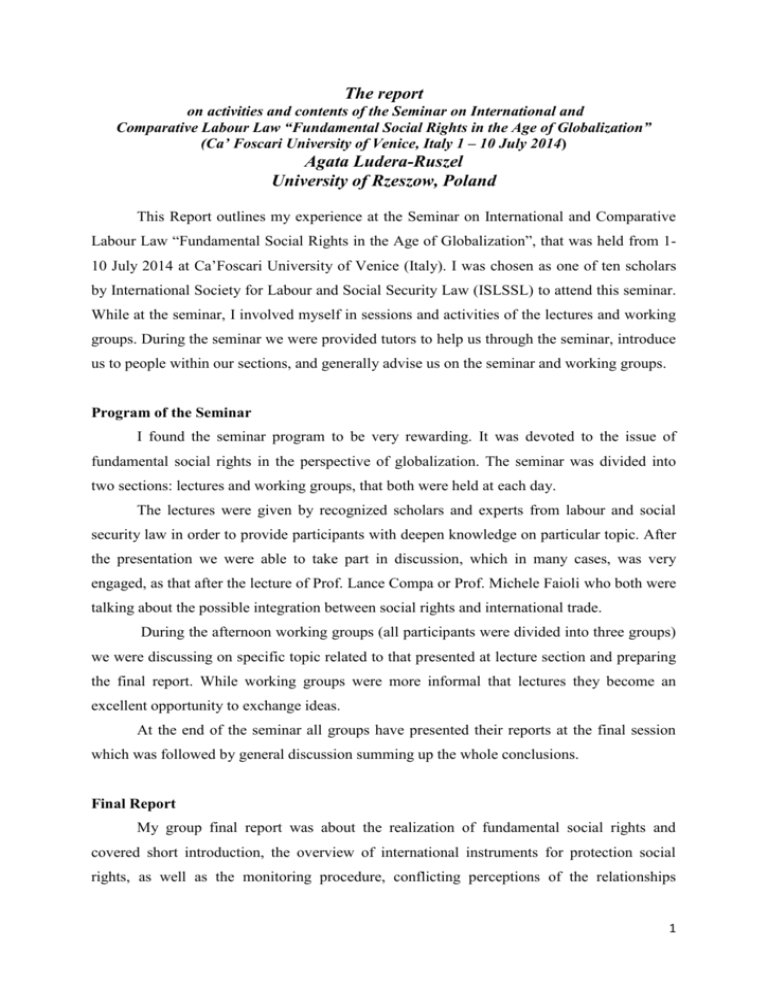
The report on activities and contents of the Seminar on International and Comparative Labour Law “Fundamental Social Rights in the Age of Globalization” (Ca’ Foscari University of Venice, Italy 1 – 10 July 2014) Agata Ludera-Ruszel University of Rzeszow, Poland This Report outlines my experience at the Seminar on International and Comparative Labour Law “Fundamental Social Rights in the Age of Globalization”, that was held from 110 July 2014 at Ca’Foscari University of Venice (Italy). I was chosen as one of ten scholars by International Society for Labour and Social Security Law (ISLSSL) to attend this seminar. While at the seminar, I involved myself in sessions and activities of the lectures and working groups. During the seminar we were provided tutors to help us through the seminar, introduce us to people within our sections, and generally advise us on the seminar and working groups. Program of the Seminar I found the seminar program to be very rewarding. It was devoted to the issue of fundamental social rights in the perspective of globalization. The seminar was divided into two sections: lectures and working groups, that both were held at each day. The lectures were given by recognized scholars and experts from labour and social security law in order to provide participants with deepen knowledge on particular topic. After the presentation we were able to take part in discussion, which in many cases, was very engaged, as that after the lecture of Prof. Lance Compa or Prof. Michele Faioli who both were talking about the possible integration between social rights and international trade. During the afternoon working groups (all participants were divided into three groups) we were discussing on specific topic related to that presented at lecture section and preparing the final report. While working groups were more informal that lectures they become an excellent opportunity to exchange ideas. At the end of the seminar all groups have presented their reports at the final session which was followed by general discussion summing up the whole conclusions. Final Report My group final report was about the realization of fundamental social rights and covered short introduction, the overview of international instruments for protection social rights, as well as the monitoring procedure, conflicting perceptions of the relationships 1 between economic freedoms and fundamental social rights, external action, role of social partners and Corporate Social Responsibility (CSR). The whole analysis lead us to the few conclusions that are, as follow: Firstly, during the last decades the relations between economic freedoms and fundamental social rights are suffering a re-balance. Different reasons, as globalization, economic crisis, European integration and international economic cooperation are reinforcing the opening of a new phase of relation between labour law and market law where the first would be used as a tool to achieve a better functioning of the market, even if this imply an involution of fundamental social rights protection. Secondly, international labour law may become an important instrument to re-balance the relationship between fundamental social rights and economic freedom. Although it is not an easy way, the latest trends in case law and doctrine approved by the international monitoring bodies shows an interesting evolution. ILO bodies and the European Committee of Social rights are gaining power and importance as protectors of fundamental social rights at the international and national level as the example of Spain (ILO Committee of freedom of association in the report that covered the labour law reform approved in 2012, stress that the principles governing consultation and bargaining remain valid during crises even if the crisis situation require the taking of urgent measures) and Greece (European Committee of Social Rights, considered five collective complaints related to austerity measures, came to the conclusion that even though restrictions to the benefits available in a national social security system do not under certain conditions breach the Charter, the cumulative effect of restrictions introduced as "austerity measures", together with the procedures applied to put them into place, may amount to a violation of the right to social security. ILO Committee on Freedom of Association examined similar complaints submitted by trade unions and called on Greece to bring its labour relations system back to fundamental rights, as protected by the ILO Conventions). Thirdly, while taking into account the European GSP+ we concluded that the countries were selected mainly for political reasons, not because they were the better ones in abiding fundamental social rights or the more needy ones. Therefore, we cannot said that the efectiveness of fundamental social rights is really the main reason behind that trade politics. Anyway, it is possible to find some kind of positive effect. In that vein, the GSP+ policy has been useful for the ratification of the core ILO Conventions, which is very important, because it permits some other future effects at the domestic level. After all, they are obliged to subject themselves to the monitoring procedures of the ILO in order to maintain their privileged status. Fourthly, European GSP+ is more firmly attached to the ILO (including some sort of coordination with ILO bodies) than the USA one. While the 2 USA GSP is much more accessible, as the unions or other organisations are allowed to make complaints, and also more transparent, because the content of the debate is easy to know. Fifthly, the globalization has set a challenge to collective bargaining and social dialogue. The realization of Fundamental Social Rights depends of the balance of power between capital and workers and nowadays, as the economic power moves on a transnational level, it became very important to built a sort of international or transnational union organisation. Sixthly, and finally, considering Corporate Social Responsibility (CSR), the improvement towards sound industrial relations depends on a balance of power between capital and labour. Unilateral measures are difficult to take seriously, if there is not any kind of democratic control and contractual commitment. The risk of the CSR code to be merely an instrument of window dressing is imminent. Overall Impression My overall impression of the seminar was that of an efficiently run and wellmanaged event that caters to all legal scholars, graduate students and experts specialized in international labour law and labour law. For me attending an international meeting of academics from all around the world was a great opportunity to exchange ideas and acquire a new experience, especially for me as a young researcher who had never participated in this kind of event. Attending lectures delivered by renowned scholars and experts put reality with my theoretical knowledge and extend my understanding concerning International Labour Law. Moreover, it was a essential step on my career ladder to become in the future an independent researcher with international experience. Meeting people from all around the world allowed me to build my network of individuals that may in the future lead to broader scientific cooperation in grants, conferences, articles. With this regard, I look forward to attending more seminars devoted to the issues of labour and social security law in future. 3
